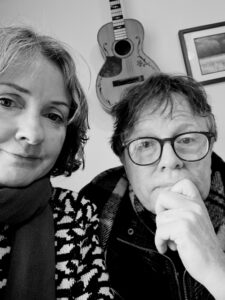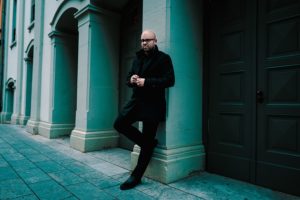ERNESTO DIAZ INFANTE
1. Let us know about the past of Ernesto…
The history of Ernesto Diaz-Infante goes back to the early eighties when I played and recorded in a Spanish spandex wearing boy band called Cielo Azul. During the mid-eighties, I did a lot hometaping: I wrote and recorded a lot of songs on a 4-track, which recently Seagull record label is releasing as a cassette boxset.
From 1987 to 1990 I got involved with Chicano politics and this gave me an outlet for the rage and anger I felt around my experience in a white, racist culture. Later I channeled my energy into studying avant-garde music at the University of California Santa Barbara and Cal Arts. In 1997, I started Pax Recordings record label and released my first album”Itz’at” of solo piano compositions. Ever since I’ve continued to record and collaborate with numerous musicians. I recently fell in love with a woman who’s blown my mind and soul. (Bay Area filmmaker Marjorie Sturm) .
I know that sounds like a clichι but it’s true. We’re excited about our first love child born out of a mad love. It feels great to be living a hermetic life, slowing down and seeing the subtleties that shimmer.
2. How would you characterize your music?
Noise? Outsider music? Experimental? Nihilistic? It’s certainly not black metal. Honestly, I don’t like to characterize my music. It’s beyond characterization. But if I had to my music is a celebration of life and death and the unconscious and political evolution. Something like the Surrealists. It’s spiritual and nihilistic. I didn’t specifically set out to be a freak, but I did have it as a goal that I wanted my music to be really heavy and slow. I believe it’s very fresh, not easy to remember, and not cheerful. It has a bit of everything, but I like to play really slow. Some of the new material definitely focuses on guitar and mumbling vocals. Some of the songs are about capitalism, corporate fascism and about male culture and its limitations. But generally, it is hard for me to conceptualize what it is. I think that if there is anything that it is more similar to it, I hope that the attitude is similar to the DIY punk rock thing. I want to maintain the “fuck you” of punk rock in a dark, thought-provoking way, even if it’s hard to listen to, but helps us bear witness to our existence.
3. What kind of sounds do you use in your experimental effort?
Crazy-ass punk, soft rock, something mellow, something that’s gonna make them think about killing or loving people, violins and symphony, something that’s gonna scare ’em! Long-ass song titles that annoy people, too, spiky-haired guitar rock, something catchy that they will stop and listen to, a sound that will make them think hard about life and send a powerful message about Christianity, corporate democracy, and the repressive socialization we all experience (particularly women). I also like voices, nature, media technology “pop” music, fine art music. Everything: Hiss, purr, and meow! I also like to make sounds that no one can hear them. Irregular or variable sounds that tend to increase alertness When it comes to it, I use any sound that will work in the composition of a song or an instrumental. I also like the sound of a frat crowd cheering at a party at 3 A.M. (joke!), or a Prophet 5 analog synthesizer sound or the sound of waves breaking on a cold San Francisco beach”. M’mmmmmmmmm, brownies and Ram Dass.
4. I fell that somewhere in, there’s a Jazz atmosphere…
That, too!
5. Would you like to talk us about your latest release with Pax Recordings?
“s/t ” is my 5th solo album for Pax recordings. I produced the album and recorded it at Scott Looney’s studio in Oakland California. Musically wise it’s more intense, straightforward and slower, that’s the biggest change. The music still contains the ingredients of Ucross, though, it’s still very conceptual, engaging and dark. It contains 30 tracks of pure self-expression of songs, instrumentals, and field recordings.
Furthermore the production is incredible, which is the result of my experience and choosing the right studio and sound engineer (Scott Looney) for the production I had in mind and I think I really succeeded in getting a phenomenal audiophile production. For those who don’t know my music, I’ll recommend to begin with this album. I’m very proud of “s/t” and I hope that the esoteric underground community will enjoy it.
6. What about the lyrics or voices of this album?
The lyrics in general deal about all kinds of human emotions and a whole range of things – many of them are simply about how life is,or how life could be, some are slightly deeper and questioning life, the universe and everything. I suggest you take a look at them and decide for yourself. Some of the lyrics are inspired by my dreams. Some of them are personal experiences, snippets of conversations I’m involved with, soundbites of conversations I hear on the streets, automatic writing or some of them are just pure fiction like living in Los Angeles or New York. Sometimes I like to channel myself into specific states of mind and describe how people in certain situations would feel or not feel.
7. Is there any relationship between the song titles?
Sometimes the song title is taken from a line from the lyrics. Sometimes it’s a found object found on the bus floor or scotch-tape pasted radomly from a newspaper. I try to make it fun coming up with song titles.
8. Are you going to bring this experimental music live on stage and how?
It’s a major challenge and that’s one of the reasons I’m taking a long break from performing experimental music live. I think it’s a difficult for experimental music especially music without a beat to do well, in let’s say, a nightclub environment. Most people don’t want to go out to hear music to scratch their heads and think. They want to be entertained like a Hollywood movie, or nod their head to the beat, or get down dirty and dance. And feel the beat. It’s a shame because I really like making experimental music and performing it live, and I think there’s a place for it, and it’s not in clubs or conventional venues. The best environments I think for experimental music is a personal environment: listening at home, in a living room, on a personal CD walkman or in a car. I think that’s also the future for the next generation of underground filmmakers with DVD technology. It’s good sometimes to do community outreach and bring experimental music in clubs and venues, but people are so conditioned to want the beat and it makes it so difficult to survive financially on a tour when you’re playing to two guys and a dog. It’s depressing. I’d rather stay home and record in a studio and make CDs.
9. What about your next plans?
Time to relax in the hammock with a plate of double chocolate brownies. (Well, except that it’s a foggy summer in San Francisco). I guess I’m just mellowing out and preparing for the baby on the way?
10. Send a message to our readers
Thanks for your continued support and buy my CDs! And remember always:
“The monopoly capitalists – even while employing purely empirical methods – weave around art a complicated web which converts it into a willing tool. The superstructure of society ordains the type of art in which the artist has to be educated. Rebels are subdued by its machinery and only rare talents may create their own work. The rest become shameless hacks or are crushed”. – Ernesto Che Guevara

